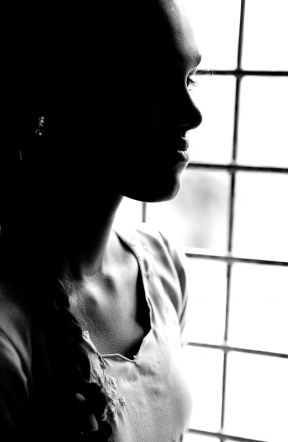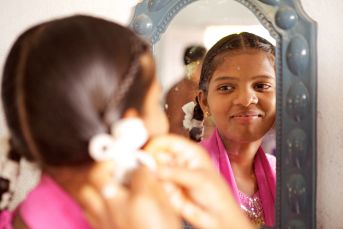Hope for the daughters of India

Going to the toilet in public near the railway line. Queuing for a tap shared by 200 people. Eating leftovers after male family members have had their meal.
Everyday life is hard for 14 year-old Munni*, who lives with her family in a slum area of Patna in north east India. Her father and mother work all hours as sweepers and are not often at home.
This makes Munni feels scared because older boys and men in her neighbourhood drink, get into fights and take advantage of young girls. Her confidence is low and it is hard for her to see beyond her present state. Munni knows very soon she will be married and will have to leave home. It's a thought that disturbs her.
According to a UN report, India is "the most dangerous place in the world to be born a girl" with females almost twice as likely as males to die before reaching the age of five. Female foeticide and infanticide is common.
Many women terminate their pregnancies if a girl is predicted by ultrasound. If born, families instruct mothers not to bring baby girls home. Infant females are often found abandoned on the roadside and outside religious places.
Girls who do live past their fifth birthday face several obstacles as they grow up. More than half of 5 to 9-year-old Indian girls are illiterate. Girls are twice as likely to be out of school and working in a domestic role.
In Bihar state, where Munni lives, two-thirds of all 15 year-old girls are malnourished, while half of all girls are married by the age of 18.
"The birth of a girl child is bad news for a family," says Devesh Lal, Network Consultant in India for the international Christian children's charity, Viva. "Males are preferred because they can continue the family line. They take care of their parents when they become elderly and, for religious reasons, only they can perform post-death rituals when parents die.
"Daughters are considered a drain to the family's wealth because a huge amount of dowry is needed when they are married. Girls are considered a liability and a security risk."
As girls become older, sexual abuse is a very real threat. In India, more than 7,200 children – mostly females – are sexually assaulted every year, something that a landmark government survey describes as "disturbingly common". Nearly 40,000 children are abducted every year and trafficked into the sex trade or into bonded labour.
Devesh says, "Abuse from the family members and friends is prevalent. Since girls have no voice, they keep quiet about it. Families also try to keep it as a secret because if the incident comes to light then their daughters will earn a bad name and nobody will come forward to marry her. Girls from socially marginalised communities have even less security."
In such a bleak situation, Christian charities such as Viva bring a ray of hope. Viva has partner networks in six cities across India, inspiring lasting change in the lives of over 150,000 children through the power of collective action.
In total, over 350 churches and community groups are coming together to address key issues of children, with the support of marginalised girls as a key focus.

Jane Travis, Viva's Programme Development Manager, believes the networks are effective in tackling the huge issues facing children at risk in India. "There are many Christians in this country responding to children in their communities in a well-motivated, heartfelt way, but they are often working in isolation without access to information and resources.
"Viva connects Christians working with children and helps develop their capacity through training. In this way, experiences, expertise and resources are shared. By working together, the impact on children's lives is bigger than if churches and agencies are responding alone."
One Viva-led programme that has impacted 700 marginalised girls and boys in Patna and Delhi is called 'Dare to be different', which aims to equip adolescents with positive life skills training. It is a biblical-based tool, which covers important topics like God's love, self-esteem, peer pressure, HIV and AIDS, and making correct life choices.
Devesh says, "Dare to be different changes children's attitude towards life. They give up high-risk activities, grow self-esteem and become growth-oriented."
Training is given to mentors, who are volunteers from churches, and this was developed last year with four seminars held for parents. The programme has extended its influence and credibility across Christian denominations, including the Catholic Church, and with leaders of schools and locally-based NGOs.
A pool of 39 childcare workers have been trained through the project in Patna. One church leader says, "I now feel equipped and more confident to deal with issues of individual children. I now have a tool to transform the lives of adolescents."
Fast forward a year and going on the 'Dare to be different' course has totally changed Munni's outlook on life. Now, she is able to take better care of herself and is more equipped to protect herself from abuse. She understands why the changes in her body are taking place and her self-esteem is improving.
She is taking her studies seriously and dreams of becoming a teacher – her hope is to make a difference to children from poor communities. For girls, Munni can be a role model in the future.
*Name has been changed to protect her identity
Andrew Dubock is Viva's Communications Manager. Find out more about Viva, which impacts the lives of almost a million children in 20 countries worldwide, at www.viva.org.











